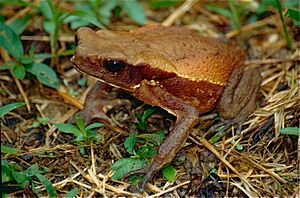Smooth-sided toad facts for kids
Quick facts for kids Smooth-sided toad |
|
|---|---|
 |
|
| Conservation status | |
| Scientific classification |
|
| Kingdom: | Animalia |
| Phylum: | Chordata |
| Class: | Amphibia |
| Order: | Anura |
| Family: | Bufonidae |
| Genus: | Rhaebo |
| Species: |
R. guttatus
|
| Binomial name | |
| Rhaebo guttatus (Schneider, 1799)
|
|
| Script error: The function "autoWithCaption" does not exist. | |
| Synonyms | |
|
|
Script error: No such module "Check for conflicting parameters".
The smooth-sided toad or spotted toad (Rhaebo guttatus) is a type of toad found in the family Bufonidae. It used to be called Bufo guttatus.
You can find this toad in the Amazon rainforest areas of Bolivia, Brazil, Colombia, Ecuador, Peru, and Venezuela. It also lives in the Guianas region, which includes French Guiana, Guyana, and Suriname. Some toads found in southern Peru, Bolivia, and Brazil might be a slightly different, but related, species called Rhaebo ecuadorensis.
Appearance and Features
Male smooth-sided toads grow to about 15 centimeters (about 6 inches) long. This measurement is taken from their snout (nose) to their vent (the opening where waste leaves the body). Female toads are usually bigger, reaching up to 17.4 centimeters (about 6.8 inches) and sometimes even 25 centimeters (about 10 inches) long.
Their back color can be cream, very light brown, or reddish-brown. Their belly is a darker shade. A cool feature of this toad is a noticeable ridge, or raised line, in front of its eyes. This ridge is easy to see, even on young toads.
The smooth-sided toad has a special way to protect itself. It can release a substance called a bufotoxin from glands located behind its eyes. This toxin is the toad's main defense. It can be harmful to other animals if they try to eat the toad.
Where They Live and How They Are Protected
These toads live in tropical moist lowland forests. They especially like mature gallery forests, which are forests that grow along rivers or streams. You can usually find them on the ground or hidden in thick layers of fallen leaves on the forest floor.
Even though they are found in many places, the smooth-sided toad can be threatened in some areas. This is mainly due to habitat loss, which means their natural homes are being destroyed or changed by human activities.
 | Selma Burke |
 | Pauline Powell Burns |
 | Frederick J. Brown |
 | Robert Blackburn |


